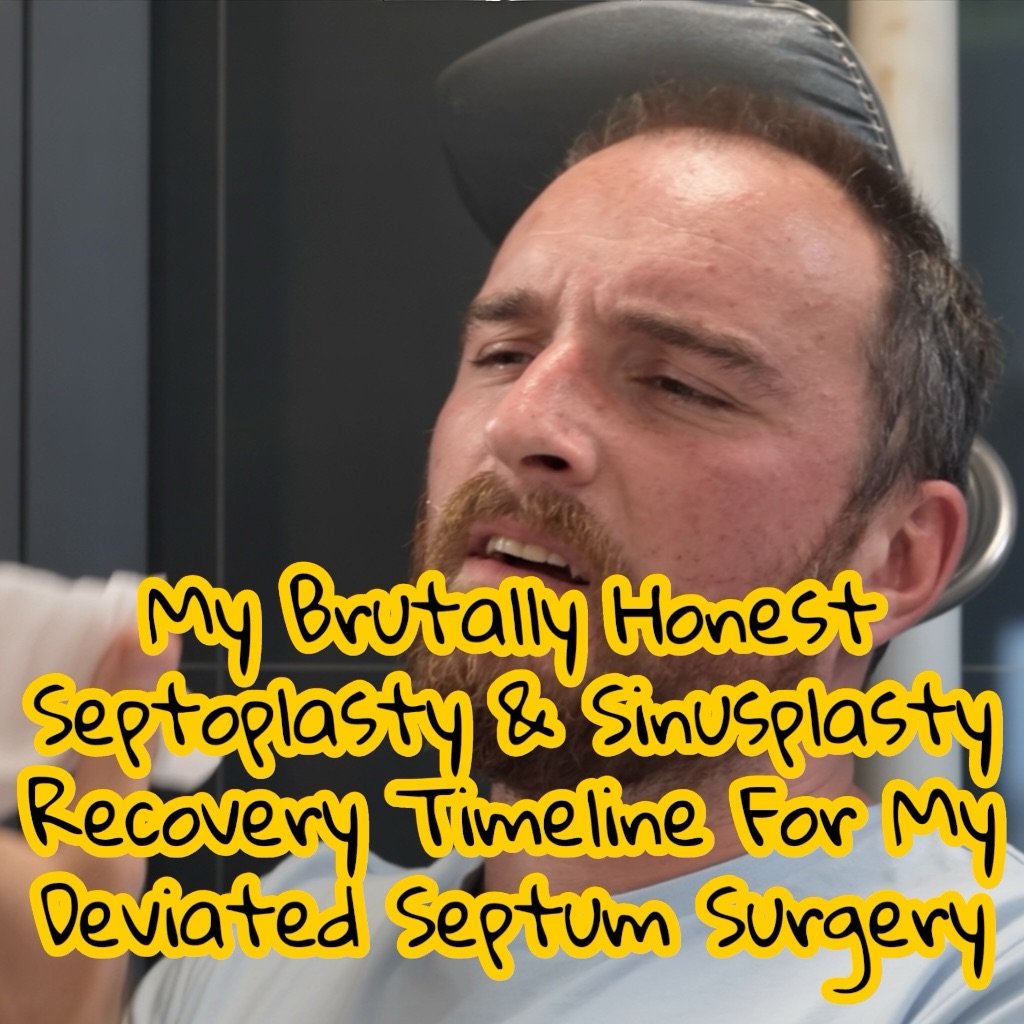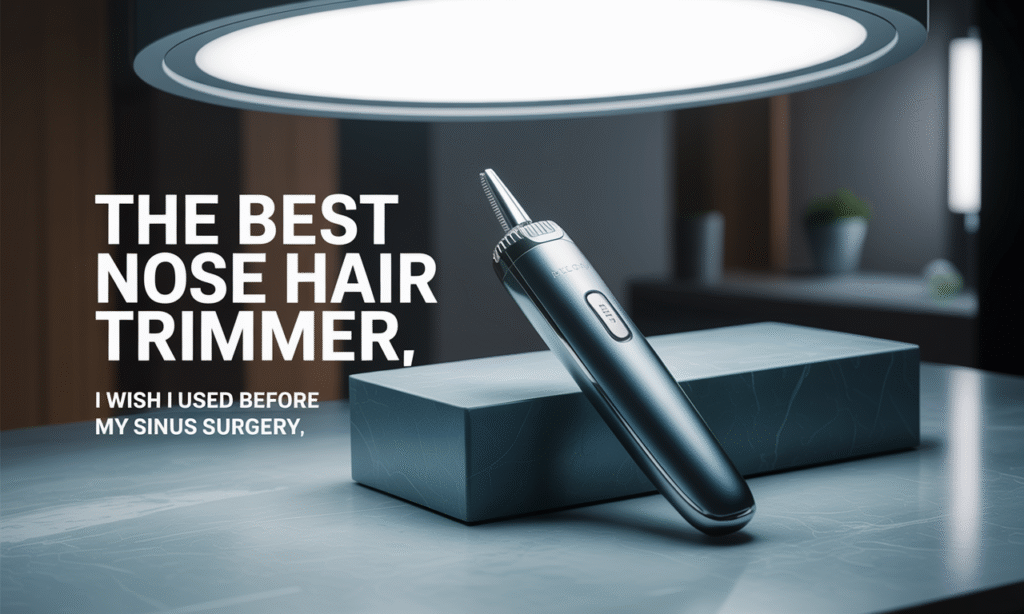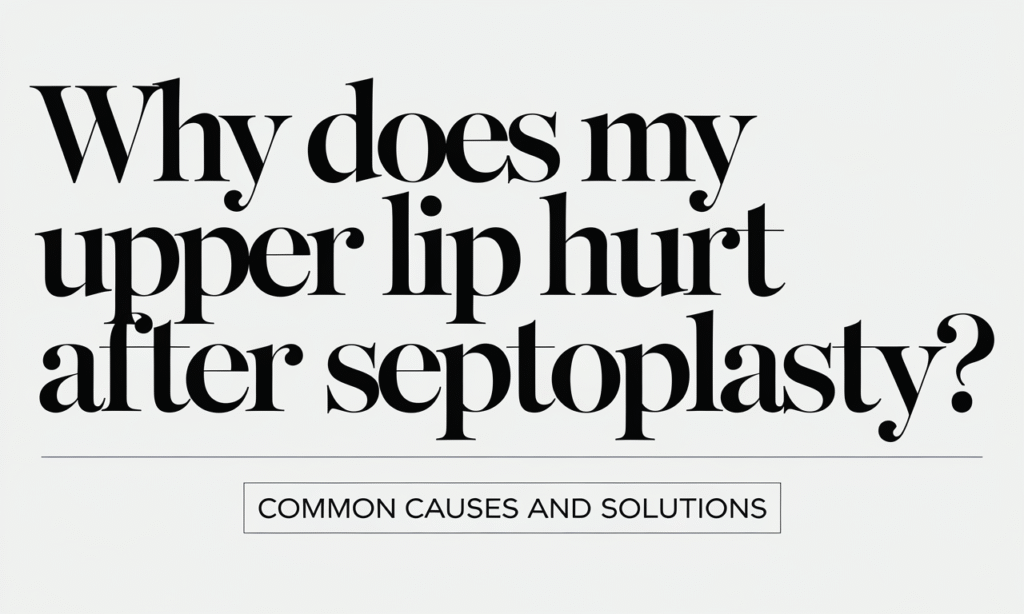
Why Does My Upper Lip Hurt After Septoplasty?
If you just had sinus or septum surgery and you’re sitting there wondering, why does my upper lip hurt after septoplasty?, you are not alone. I asked myself that very thing almost every hour for the first week. It caught me totally off guard — and to be honest, no one warned me it would hurt this much.
That pain you’re feeling under your nose, along your gums, and even in your teeth? Yeah, it’s all connected. And it’s a lot more common than you’d think, even if doctors rarely talk about it.
What the Heck Causes This Lip and Tooth Pain?
Let’s break it down the way I wish someone had for me:
Your nose, upper lip, and front teeth all share a network of nerves, including the infraorbital nerve that runs from the cheek into the gums and lips. When you go through septoplasty or sinus surgery, all that cutting, stretching, and swelling messes with those nerves.
So when you feel:
- Stabbing pain behind your top front teeth
- Burning sensation in your upper lip
- A weird numb-then-throbbing feeling when you try to talk or chew
…it’s not in your head. It’s nerve pain. And it’s directly tied to the trauma your nose just went through.
In my case, it started right after surgery and peaked around Day 3 to Day 5, which I talk more about in my brutally honest septoplasty recovery timeline. That upper lip pain made it almost impossible to eat or talk. Every time I moved my mouth even a little, it felt like something was ripping just under my nose.
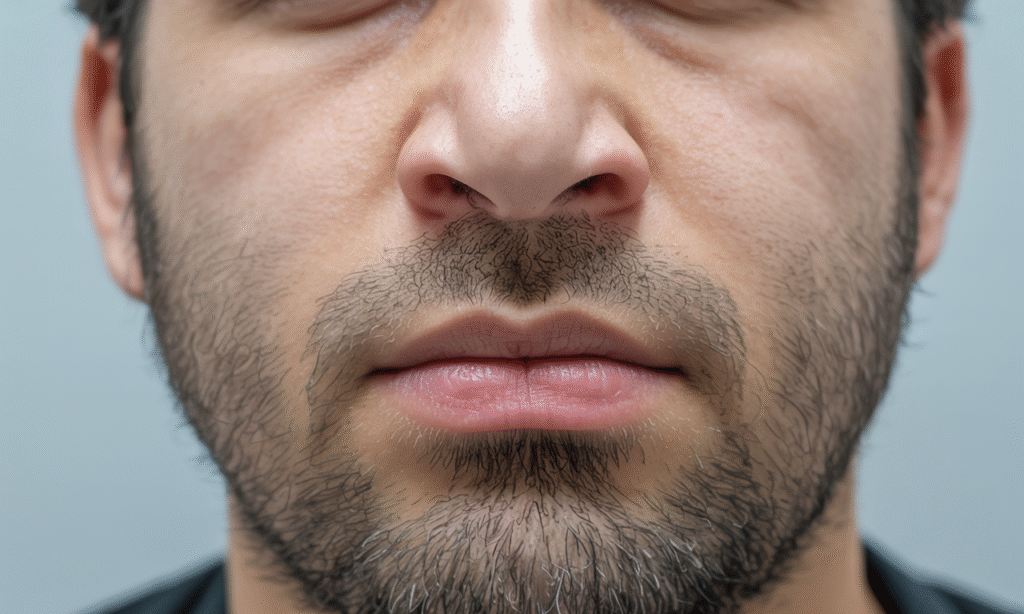
When the Pain Shows Up (And How Long It Sticks Around)
For me, the pain behind my upper lip showed up as soon as the surgical numbness wore off — around 8 hours after surgery. But it got way worse as the swelling set in.
Here’s how it went:
- Day 1–2: Mostly soreness and swelling
- Day 3: Bam. Burning pain in the lip and behind my front teeth. Felt like a lightning bolt firing off under my nose.
- Day 4–6: Every bite of food, every word spoken, made my upper lip feel like it was being yanked on
- Day 7+: It started to fade slowly — but didn’t totally go away until around week 3
Some people say their lip pain only lasted a few days, but in my case it was a solid 10+ days of noticeable pain, even with Tylenol and hydrocodone in rotation.
What Makes It Worse? (And What to Avoid)
There are a few things that made my septoplasty lip pain spike like crazy:
- Talking too much – Moving your mouth pulls on the stitched-up tissue inside the nose
- Chewing anything crunchy – Even soft food could cause pain if I moved my jaw too wide
- Yelling or crying – Ask me how I know… Day 3 was rough
- Cold dry air – Breathing through my mouth all night dried out my lips, making everything worse
- Trying to clean around the nostrils too early – Don’t mess with the area near the base of your nose
And yeah, if you’ve got stitches inside your nose? That tugging pain under your lip is tied to that too. I cover all of that in detail in my full guide on how long septoplasty stitches last if you’re dealing with similar irritation.
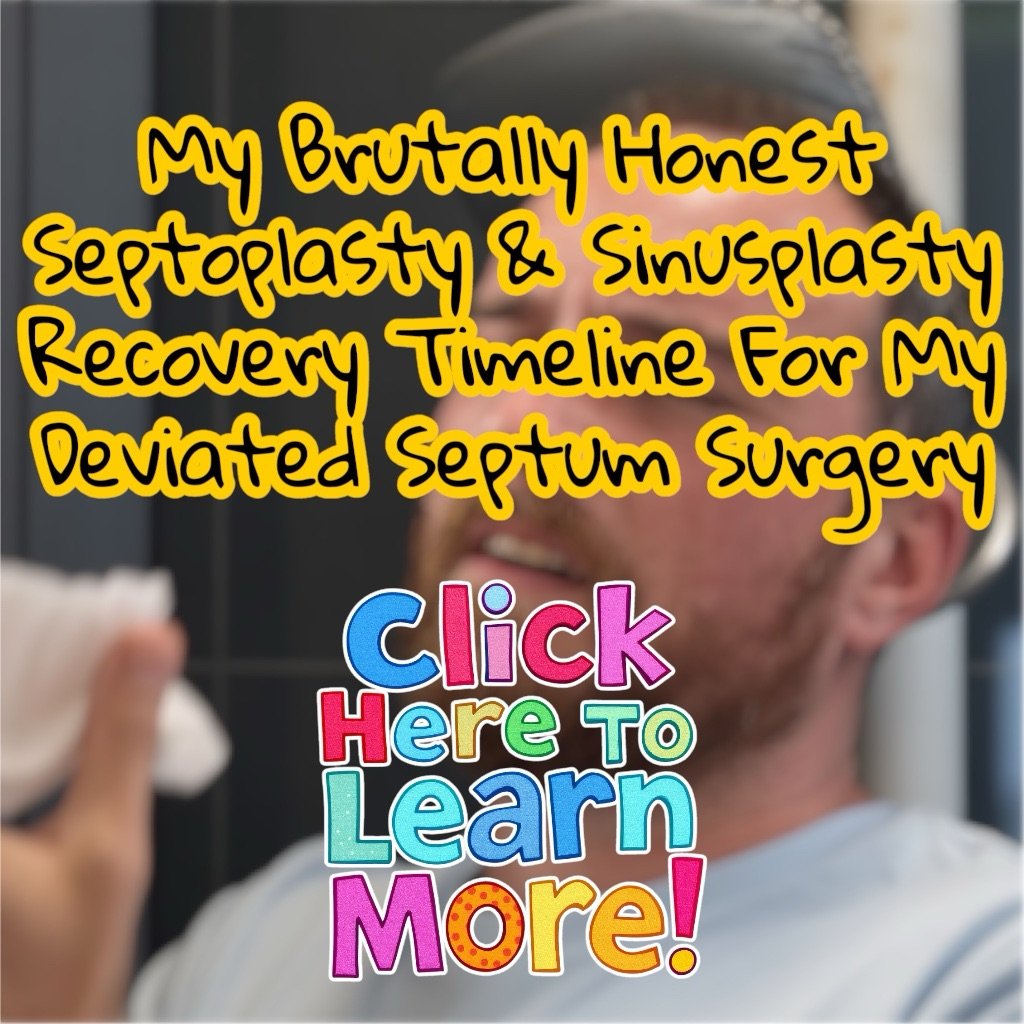
What Helped Relieve My Septoplasty Lip Pain
I tried a lot of things to deal with the upper lip pain after my sinus surgery, and not all of them worked. But a few gave me just enough relief to get through the worst of it.
Here’s what actually helped me:
1. Ice packs – I kept a soft ice pack on the upper lip/cheek area off and on throughout the day. It didn’t eliminate the pain, but it numbed the throbbing for 15–20 minutes at a time.
2. Humidifier – Dry air made everything feel worse. A warm or cool mist humidifier running 24/7 helped keep my mouth and lips from drying out, especially when I couldn’t breathe through my nose.
3. Lip balm – This sounds basic, but my lips got so cracked and raw from mouth breathing that everything hurt worse. Constantly reapplying lip balm helped reduce that pulling sensation when I talked.
4. Staying quiet – I limited how much I talked during the worst pain days (especially Day 3 through Day 6). It gave the tissues a chance to calm down.
5. Warm compress under my nose – After the ice, sometimes gentle warmth helped relax the tight muscles and ease that electric nerve pain that radiated into my teeth and gums.

Should You Be Worried About Lip or Tooth Pain After Surgery?
The short answer? Usually no.
It’s normal to experience some mouth pain after sinus surgery, especially after septoplasty, and it’s often just from swelling and nerve irritation in that area.
But there are a few signs where you might want to check in with your ENT or surgeon:
- Pain is getting worse after Day 7, not better
- Numbness in the lip or teeth that doesn’t fade after a few weeks
- You feel a sharp object or stitch poking inside your lip or gum
- Swelling or pain is only on one side, and feels very localized
- Signs of infection like redness, pus, or fever
In most cases though, that upper lip pain is part of the healing process, especially if your surgeon had to work deep in the septum or near the front of the nasal cavity. Mine reassured me that what I was feeling was very common — just something nobody talks about enough.
How Long Does Upper Lip Pain Last After Septoplasty?
If you’re like me, you’re probably wondering, how long is this gonna last? Because when you’re in it, it feels like forever.
For me, here’s how it played out:
- Day 1–2 – Slight soreness, didn’t think much of it
- Day 3–6 – Intense burning, nerve pain, throbbing under the nose and upper teeth
- Day 7–10 – Pain faded a bit each day but still very noticeable
- Week 3+ – Occasional soreness but mostly gone
So, in total, I’d say the worst of the upper lip pain lasted about a week, and it wasn’t until around week 3 that I felt close to normal in that area.
If it goes beyond that without any improvement, or you’re dealing with numbness or weird nerve sensations, bring it up at your follow-up.
Why This Part of Recovery Caught Me Off Guard
I expected nose pain. I expected congestion. I even expected black eyes and swelling. But no one told me about the pain behind my upper front teeth, or the burning in my lip, or the way it would feel like I got punched in the mouth every time I tried to talk.
What’s crazy is that when you Google it, there’s almost nothing out there about this part of recovery. And yet, after posting about it in a forum and asking around, it turns out tons of people experience this after sinus surgery and septoplasty.
It’s just another one of those “they forgot to warn you” symptoms that hits hard and leaves you wondering if something went wrong.
If you’re going through this too, just know:
It’s probably normal, it will fade, and no — you’re not the only one.

My Advice If You’re Dealing With Lip Pain After Septoplasty
If I could go back and prepare myself better for this part of recovery, here’s what I’d tell myself — and now I’m telling you:
- Yes, upper lip pain after septoplasty is normal
- It can feel sharp, electric, burning, or like pressure behind your teeth — and it’ll freak you out if you’re not expecting it
- It won’t last forever, even though it absolutely feels like it will in the moment
- Take it easy on talking, chewing, and moving your face in general for a few days — your nose and lip are more connected than you realize
- Keep your lips hydrated, your air moist, and your expectations realistic
- And don’t hesitate to call your ENT if something feels wrong. They’ve seen it all before.
This part of healing felt like such a lonely symptom — no one warned me about it, and I thought I was the only one going through it. But after digging around online and asking others, it turns out this is a very common issue after septoplasty and sinus surgery — just rarely talked about.
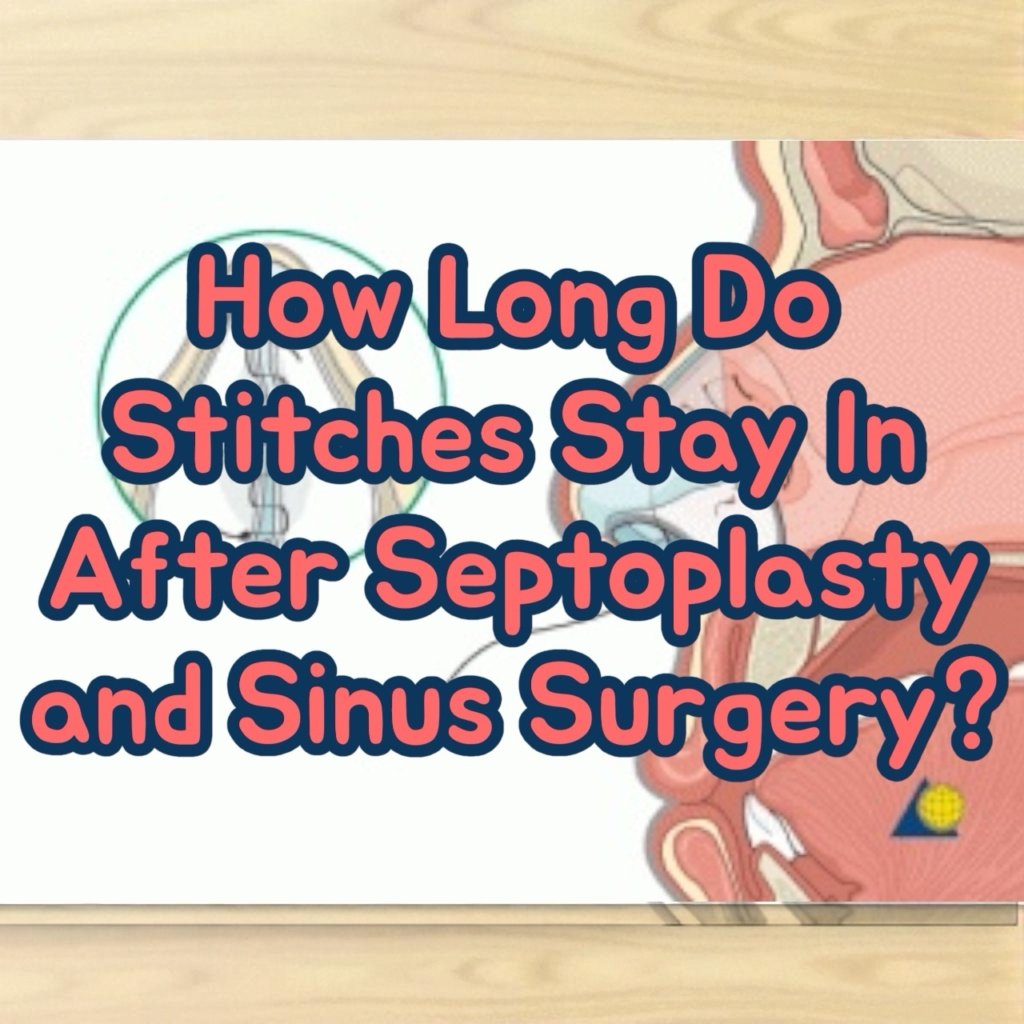
Why Does My Upper Lip Hurt After Septoplasty? Final Thoughts
So, why does my upper lip hurt after septoplasty?
It’s all about nerves. The nerves that run through your nose, gums, teeth, and lips are all connected, and when your ENT goes digging through your septum to fix things, it irritates everything nearby.
The pain feels intense — sometimes worse than the nose pain itself — but in most cases, it’s a normal part of the healing process. Mine lasted about a week at its worst and then faded slowly after that.
If you’re in the thick of it right now, just know:
You’re not crazy. You’re not weak. You’re just healing.
And if you haven’t already, check out my full day-by-day sinus surgery recovery article to get the full picture of what this journey is really like — not just what the hospital pamphlet tells you.
As an Amazon Associate we earn from qualifying purchases through some links in our articles.
